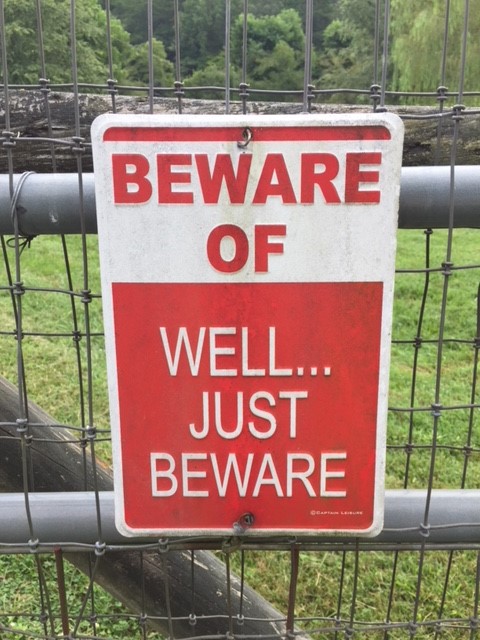

by Tracy Cotton CISR, CIC
You protect your livestock from predators with fencing and guardian animals. You protect your crops with preventative measures such as field rotation and irrigation. You protect your machinery with regular inspection and maintenance.
What are you doing to prevent danger from opening your farm to guests?
Danger can come from many sources. Maybe it’s preventable like locking up sharp tools or maybe it’s unpreventable like a lightning strike before rain ever starts. The old adage, “An ounce of prevention is worth a pound of cure” is especially true in what you can do to reduce the risks on your NC Agritourism Farm.
Even if you can’t prevent the danger you can be prepared for the aftermath.
These 30 actionable tips can help you improve your preparation in the off season, safety focus during the season, and protecting yourself when danger turns into worst case scenarios.
BEFORE your season begins:
- Review the plans for entrance, exit, parking, restrooms, hand washing, food/beverage, signage, handicap accessibility, first aid, shelter from the sun, places to sit, etc. and decide if any adjustments should be made based on the prior years experience to improve safety and efficiency. This is especially important if you are adding activities.
- Inspect your NC Agritourism Liability Law sign annually. Is it visibly displayed in readable condition at the entrance to your farm at minimum? Consider adding a second sign where guests pay for admission or enter the activity area. A Spanish version is available for farms where there are regular guests who speak Spanish. Contact www.ncana.org to purchase new signs.
- Create or revise your permission/liability waiver annually (consider offering a Spanish version) – consult with your attorney on wording.
- Develop an Emergency Response Plan and update annually. Consider unforeseen events such as tornados, active shooters, forest fire. Consult with fire and emergency response units in your area to evaluate access to your farm.
- Create or update farm safety rules that are posted and enforced by your staff.
- Spend time training all staff and volunteers on the Emergency Response Plan, Safety Rules, and assign how first aid will be administered. Have everyone rehearse the procedures.
- Review safety equipment condition prior to season (especially fire extinguishers and smoke detectors). Review equipment manuals for safety warnings and procedures. Keep readily accessible for all staff.
- Create or update your Accident report. Provide ample spaces to capture name, address, and phone number of person making the report and same information for any witnesses.
- Review your contracts annually with your attorney that you use for renting out any part of your farm (B&B guest, AirBnB renter, weddings, retreats, private parties, even birthdays). Check that the contract includes the NC Agritourism statute, your safety rules, and any insurance requirements of the renter (i.e. event or wedding liability, especially covering alcohol if that is allowed).
- Invite your insurance agent to visit the farm prior to season to walk through and provide additional insight.
- Review your insurance policies annually with your insurance agent and notify them of any changes or additions to your activities.
DURING season: - Utilize safety checklists on a daily basis in season so that all equipment, fencing, signage, hygiene, are monitored prior to guests arrival
- If cell phone service is unpredictable or weak use walkie-talkies to communicate amongst staff but make sure everyone has one (or at least one worker in every area where guests are).
- Make sure all the staff have breaks, stay hydrated, etc. so they can be at the top of their game for the guests.
- Consider having a “secret shopper” visit (on a busy day if possible) and report back if they observe trouble areas or staff concerns.
- Monitor the feedback from guests, including mentions of your farm on social media. It’s important to make sure you address negative reviews ESPECIALLY if they are safety related, but also from a public relations aspect.
- Recognize excellent safety compliance by staff or volunteers. Low cost ideas include a small gift card or traveling “trophy” for an outstanding job of finding or solving a safety issue.
- Praise your staff publicly, reprimand privately – especially on safety issues. Document if a paid employee or even a volunteer is “fired” for failure to follow safety guidelines. Also be sure to document all training activities with staff signing a log to confirm attendance.
AFTER an incident occurs: - When an accident or incident occurs review the incident report at the earliest opportunity.
- If possible the farm owner/operator should come “on scene” to show concern and assess the severity.
- Take photos of property damage if possible.
- Determine if any photos or video was taken by a guest during an accident – you won’t be able to “confiscate” but these could be damaging possibly on the legal/insurance level if there is discrepancies in what happened versus what was reported. On a public relations level it is important to address if they get posted on social media. Be aware a photo or video could also serve as evidence of a visitor orchestrating the injury.
- Having your own video equipment as part of your security system can be beneficial.
- Most insurance carriers will want to be notified as soon as possible of the incident even if the injury seemed minor or even if the incident was not obviously “at fault” (i.e. a guest has a heart attack, a diabetic passes out, a child gets a nose bleed)
- Discuss your coverage limits and any insurance considerations you need to be aware of as soon as you file any loss with your insurance agent. They may have to defer to the claims adjuster since investigating the incident is often necessary to determine what coverages or exclusions are involved.
- Keep all information pertinent to the incident together in a safe place. Have a long term place to store even if nothing comes up immediately.
- Document all phone calls, voice mails, etc received from your insurance carrier with caller information. There are often several insurance company representatives that will be involved and referencing who you spoke with, when you spoke to them, what action was to be taken, etc could be crucial.
- If you have filed the incident as a claim, courteously refer any interested parties (i.e. injured party, their family, any doctor/hospital) to speak directly to the company unless instructed otherwise by your attorney or insurance company. If you feel uncomfortable with giving out your claim number and phone number of adjuster to someone you don’t know then offer to have the claims adjuster call them back and get in touch with your adjuster immediately.
- Use the incident as a learning opportunity and revise rules or safeguards if necessary.
- After the claim has been closed or at the end of season take time to discuss with your insurance agent if there are any anticipated repercussions with your policy. Filing a loss doesn’t necessarily equate to a higher premium at renewal, but reviewing your loss history every year is the best way to understand what to expect.
Many of these tips are free or low cost to protect your NC Agritourism farm from danger. Once an incident occurs however it is insurance protection that can prevent the inevitable danger from becoming a financial disaster. As suggested in many of these tips having a trusted insurance agent as a resource is invaluable.
If you are seeking a trusted insurance advisor in North Carolina for your Agritourism Farm please contact me, Tracy Cotton, tcotton@morrowinsurance.com or call me at the office, 828-652-6212.
Additional resources are available online:
General information:
https://asapconnections.org/resources/for-farmers/ ASAP’s Farmer resource page has a number of good articles on Agritourism.
www.nc-ana.org NC based organization that brings resources and advocacy for Agritourism farms. One of the many perks of membership is reduced pricing for Agritourism Liability statute signage in both English and Spanish.
http://www.ncagr.gov/markets/agritourism/ The main information page from NC AG for Agritourism and links to other resources including marketing.
Farm Safety Information:
www.safeagritourism.org A great Agritourism resource for walkthroughs, checklists and more from the National Children’s Center for Rural and Agricultural Health and Safety.
www.umash.umn.edu The Upper Midwest Agricultural Safety and Health Center has an in-depth library of articles, presentations, checklists and more on Agritourism (plus almost any other farm topic you can imagine).
https://www.osha.gov/dsg/topics/agriculturaloperations/ Not specifically on Agritourism but chock full of articles, fact sheets, and publications on agricultural operations. The statistics are scary but informative.
